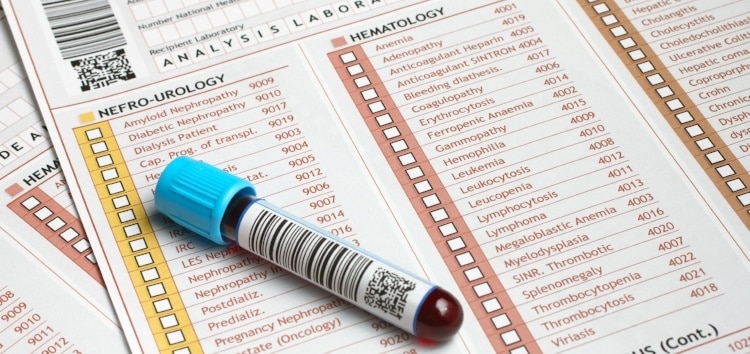Acute Myeloid Leukaemia (AML) is a group of blood cancer malignancies that originate from the uncontrolled proliferation of blast cells in the bone marrow and circulating blood1. AML is a relatively rare disorder - representing less than 1% of total cancer cases2.
Although incidence is low, the disease is aggressive. However, recent advances and improvements in testing and treatment options are increasing disease manageability and survival rates for AML patients.
The biggest movement in the past decade has been the shift away from diagnosis based on cytogenics and fluorescence in situ hybridization (FISH), and towards next-generation sequencing (NGS) gene panel assays. As NGS testing is becoming more established in clinics, the field has also seen an exciting influx of newly approved drugs for the treatment of AML patients whose cancers contain driver mutations in particular genes.
New targeted drugs for AML
FLT3 - Midostaurin (Rydapt)
The FMS-like tyrosine kinase 3 (FLT3) gene encodes the FLT3 tyrosine kinase receptor expressed on the surface of CD34+ hematopoietic stem cells and other immature hematopoietic progenitors3. This receptor activates downstream molecular pathways involved in the regulation of the cell cycle, such as PI3K, AKT, mTOR, RAS and ERK.
It is estimated that up to 30% of AML cancers contain an Internal Tandem Duplication (ITD) mutation in the FLT3 gene. This causes the receptor to be constitutively activated - leading to uncontrolled cell proliferation and the development of blood cancer.
In April 2017 the FDA approved midostaurin (Rydapt), a multikinase inhibitor for adults with newly diagnosed AML who are FLT3 mutation-positive, as detected by an FDA-approved test. This is the first targeted therapy approved by the FDA for the treatment of FLT3-mutant AML in the US4. Midostaurin is active against both FLT3-ITD and FLT3-TKD mutations, so these mutations have become critical targets for genetic testing to identify patients eligible for treatment with this promising new drug.
IDh4 - Enasidenib (Idhifa)
IDh4 is an enzyme that catalyzes the oxidative decarboxylation of isocitrate to alpha-ketoglutarate. Mutation of the IDh4 gene leads to the accumulation of the oncometabolite (R)-2 hydroxyglutarate, which disrupts several cell processes and leads to a blockage in differentiation5. A block in myeloid differentiation is a hallmark of AML, where undifferentiated blast cells, with enhanced self-renewal capabilities, can accumulate in the bone marrow6, leading to the progression of blood cancer.
In August 2017, the FDA approved enasidenib (Idhifa), an isocitrate dehydrogenase-2 inhibitor that works by blocking several enzymes that promote cell growth. It is approved for use with patients who display mutations in the IHD2 gene. Therefore, testing AML patients for mutations in the IDh4 gene has become another critical genetic check-point for clinical labs to perform to direct the correct treatment decisions for AML patients.
NGS for the detection of AML
This exciting trend of newly approved drugs and companion diagnostic tests by the FDA for AML in 2017 is closely followed by a stream of clinical trials for additional drugs with strong potential for use in this increasingly treatable disease. This positions genetic testing at the forefront of the range of clinical tools needed to guide diagnosis and treatment decisions for AML. In response to this, leading NGS assay developers have recently launched myeloid-specific multi-gene sequencing assays onto the market, in addition to an increase in custom myeloid assay use for clinical testing.
5 Commercial NGS Assays for myeloid genetic testing
- OncoMine Myeloid Research Assay Thermo Fisher Scientific 40 DNA genes, 29 RNA fusions
- TruSight Myeloid Sequencing Panel Illumina 15 full genes, 39 hotspots
- Human Myeloid Neoplasms Panel Qiagen 141 genes
- VariantPlex Myeloid Panels (4 assays) Archer Dx 11-75 genes
- FoundationOne Heme Foundation Medicine 400 DNA genes, 250 RNA targets
The importance of gene panel validation and routine QC monitoring
As with all new NGS sequencing tests, it is essential for assay developers and testing labs to thoroughly validate new assays before they can be launched for sale or introduced into a labs' routine testing. It is also best practice for testing labs to monitor routine QC performance of the assay over time, to identify any gradual drift in quality or potential issues caused by a new operator or change of reagent.
Due to the recent global increase in the development and use of myeloid NGS assays - there has been a largely unmet need for a reliable and accessible myeloid reference material that is commutable to patient samples for the validation of new assays.
Horizon's myeloid DNA reference standard
To meet this growing need, Horizon has launched its myeloid DNA reference standard. This is a cell line-derived DNA control material containing 22 variants across 19 genes implicated in myeloid cancer, including relevant mutations in FLT3 and IDh4. It is applicable for use in the development, validation, optimization and routine monitoring of myeloid sequencing assays.
This innovative Multi-gene Multiplex reference standard allows labs to perform quick, more reliable and cost-effective validation of myeloid sequencing assays - saving them time and money to achieve their quality assurance goals faster.
Key Product Features
- Large 300bp Internal Tandem Duplication (ITD) mutation in the FLT3 gene
- D835Y SNP mutation in the FLT3 gene
- SNP mutations in both IDh2 and IDh4 genes
Future outlook
It is hoped that the progressive increase in FDA-approved drugs and companion diagnostic tests for AML we have already seen will continue in the coming years, to help deliver better treatment options to cancer patients. The success of effectively delivering more genetic testing to AML patients for the direction of these personalized treatments will hinge on the accurate performance and reliability of myeloid sequencing assays.
Horizon's NEW Myeloid DNA Reference Standard is now available to order
Myeloid DNA Reference Standard
References
- https://www.ncbi.nlm.nih.gov/pmc/articles/PMC5767295/
- https://www.cancerresearchuk.org/health-professional/cancer-statistics/statistics-by-cancer-type/leukaemia-aml/incidence accessed 20Sep18
- https://www.ncbi.nlm.nih.gov/pmc/articles/PMC5789277/
- Levis M. Midostaurin approved for FLT3-mutated AML. Blood. 2017 doi: 10.1182/blood-2017-05-782292. [PubMed][Cross Ref]
- http://clincancerres.aacrjournals.org/content/early/2018/05/16/1078-0432.CCR-18-0536
- http://www.bloodjournal.org/content/130/6/693
